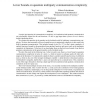95 search results - page 6 / 19 » Separating Quantum and Classical Learning |
ICQNM
2008
IEEE
14 years 4 months ago
2008
IEEE
Coin flipping is a cryptographic primitive in which two spatially separated players, who in principle do not trust each other, wish to establish a common random bit. If we limit ...
COCO
2009
Springer
14 years 4 months ago
2009
Springer
A major open question in communication complexity is if randomized and quantum communication are polynomially related for all total functions. So far, no gap larger than a power o...
ET
2010
13 years 7 months ago
2010
This work justifies several quantum gate level fault models and discusses the causal error mechanisms thwarting correct function. A quantum adaptation of the classical test set gen...
CORR
2008
Springer
13 years 10 months ago
2008
Springer
It has recently been discovered that both quantum and classical propositional logics can be modelled by classes of nonorthomodular and thus non-distributive lattices that properly...
STOC
2005
ACM
14 years 10 months ago
2005
ACM
Our main result is a reduction from worst-case lattice problems such as GAPSVP and SIVP to a certain learning problem. This learning problem is a natural extension of the `learnin...

